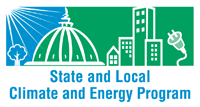 ***ICLEI Releases First National Standard for Measuring a Community’s Carbon Footprint
***ICLEI Releases First National Standard for Measuring a Community’s Carbon FootprintOn October 4, 2012, ICLEI-Local Governments for Sustainability USA released a national standard for measuring and reporting the greenhouse gas emissions associated with communities. The U.S. Community Protocol for Accounting and Reporting of Greenhouse Gas Emissions simplifies and standardizes the technical guidance necessary to complete a greenhouse gas emissions inventory, allowing local governments to gain a clearer understanding of which sources and activities within their communities are most responsible for their greenhouse gas emissions.
The Community Protocol incorporates a range of new innovations in greenhouse gas accounting, and is designed to be flexible. Local governments just beginning their climate action work can follow its basic methodology and minimum reporting requirements, while more advanced cities can choose to report a wider set of greenhouse gas activities or conduct a deeper analysis.
For more information, please visit ICLEI’s Community Protocol site. ICLEI is also scheduling webinars on the new protocol; details are available at the link above.
***FHWA Launches Web-Based Evaluation Tool for Transportation Sustainability
The Federal Highway Administration (FHWA) has launched the Infrastructure Voluntary Evaluation Sustainability Tool (INVEST), a voluntary, web-based self-evaluation tool enabling state, regional, and local transportation agencies to evaluate the sustainability of their transportation plans, projects, and programs. The tool includes three score cards: systems planning, project development, and operations and maintenance.
FHWA will hold a webcast to launch and demonstrate the tool on October 10, 2012 from 2-3 p.m. EDT. To register, visit the webcast registration page.
***EPA and NOAA Publish Guide to Hazard-Resilient Coastal and Waterfront Smart Growth
Achieving Hazard-Resilient Coastal & Waterfront Smart Growth: Coastal and Waterfront Smart Growth and Hazard Mitigation Roundtable Report, coauthored by EPA and the National Oceanic and Atmospheric Administration (NOAA), presents ideas on research, tools, services, and approaches that communities can use to integrate smart growth and hazard mitigation strategies on the coast. This report is part of a joint effort by EPA and NOAA to help coastal communities become more environmentally, economically, and socially sustainable.
Source: State and Local Climate and Energy Program



